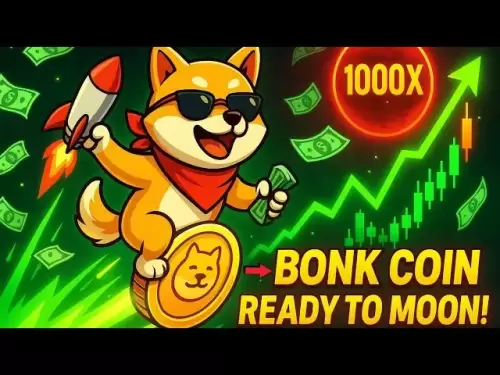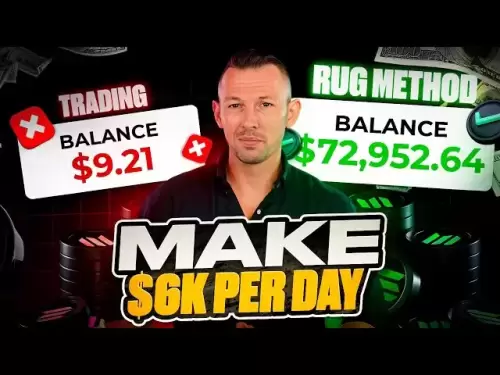-
 Bitcoin
Bitcoin $115900
-2.21% -
 Ethereum
Ethereum $3710
-3.94% -
 XRP
XRP $3.009
-4.19% -
 Tether USDt
Tether USDt $1.000
0.01% -
 BNB
BNB $783.6
-1.88% -
 Solana
Solana $171.7
-4.75% -
 USDC
USDC $1.000
0.00% -
 Dogecoin
Dogecoin $0.2098
-6.05% -
 TRON
TRON $0.3276
0.13% -
 Cardano
Cardano $0.7372
-5.46% -
 Hyperliquid
Hyperliquid $41.45
-3.60% -
 Sui
Sui $3.624
-5.88% -
 Stellar
Stellar $0.3978
-5.52% -
 Chainlink
Chainlink $16.93
-6.13% -
 Bitcoin Cash
Bitcoin Cash $570.3
-2.41% -
 Hedera
Hedera $0.2531
-6.33% -
 Avalanche
Avalanche $22.47
-5.11% -
 Ethena USDe
Ethena USDe $1.001
-0.02% -
 Toncoin
Toncoin $3.486
1.56% -
 UNUS SED LEO
UNUS SED LEO $8.933
-0.25% -
 Litecoin
Litecoin $106.7
-3.55% -
 Shiba Inu
Shiba Inu $0.00001245
-4.79% -
 Polkadot
Polkadot $3.710
-4.20% -
 Uniswap
Uniswap $9.391
-7.68% -
 Monero
Monero $307.6
-1.90% -
 Dai
Dai $0.0000
-0.01% -
 Bitget Token
Bitget Token $4.401
-3.37% -
 Cronos
Cronos $0.1412
-3.90% -
 Pepe
Pepe $0.00001077
-6.52% -
 Aave
Aave $261.6
-6.15%
How to calculate the gas fee for NFT transactions? How to buy and sell NFTs at low cost?
Gas fees for NFT transactions depend on gas limit and price; timing and Layer 2 solutions can minimize costs. Buy early or on secondary markets for low-cost NFTs.
May 10, 2025 at 08:14 pm
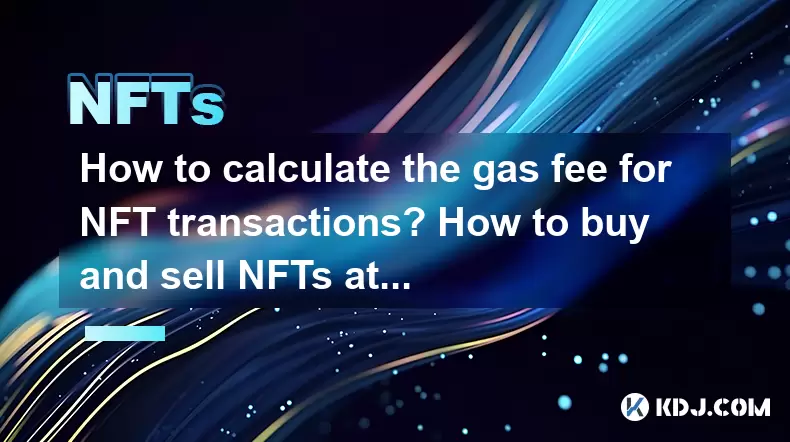
Understanding how to calculate the gas fee for NFT transactions and how to buy and sell NFTs at a low cost is crucial for anyone interested in the world of non-fungible tokens. Gas fees can significantly impact the overall cost of NFT transactions, while strategies to minimize costs can enhance profitability and accessibility. In this article, we will explore both these aspects in detail.
Understanding Gas Fees for NFT Transactions
Gas fees are payments made to the Ethereum network for processing transactions, including those involving NFTs. These fees are necessary to incentivize miners to validate and include transactions in the blockchain. The calculation of gas fees involves two main components: gas limit and gas price.
Gas Limit: This is the maximum amount of gas you are willing to use for your transaction. For NFT transactions, this can vary depending on the complexity of the smart contract being executed. For instance, minting an NFT might require a higher gas limit than a simple transfer.
Gas Price: This is the amount of Ether (ETH) you are willing to pay per unit of gas. The gas price is typically measured in Gwei, where 1 Gwei equals 0.000000001 ETH. The higher the gas price, the faster your transaction is likely to be processed.
To calculate the gas fee, you multiply the gas limit by the gas price. For example, if the gas limit for minting an NFT is 200,000 and the gas price is 20 Gwei, the gas fee would be:
[ 200,000 \times 20 = 4,000,000 \text{ Gwei} ]
Converting this to ETH, since 1 Gwei = 0.000000001 ETH:
[ 4,000,000 \times 0.000000001 = 0.004 \text{ ETH} ]
Factors Affecting Gas Fees
Several factors can influence the gas fees for NFT transactions:
Network Congestion: During periods of high demand, such as when a popular NFT collection is launched, gas fees can spike due to increased competition for block space.
Transaction Complexity: More complex transactions, like those involving multiple smart contract interactions, will generally require a higher gas limit and thus result in higher fees.
Gas Price Bidding: Users can set higher gas prices to prioritize their transactions, which can lead to higher costs but faster processing times.
Strategies to Minimize Gas Fees
Minimizing gas fees can make NFT transactions more affordable. Here are some strategies to achieve this:
Timing Transactions: Execute transactions during off-peak hours when the network is less congested. Tools like Etherscan can help you monitor network activity and gas prices.
Using Layer 2 Solutions: Platforms like Polygon (MATIC) offer lower transaction fees by processing transactions off the main Ethereum chain and then settling them back on Ethereum.
Optimizing Smart Contracts: If you are minting NFTs, optimizing the smart contract code can reduce the gas limit required, thereby lowering the overall fee.
How to Buy NFTs at a Low Cost
Buying NFTs at a low cost involves more than just minimizing gas fees. Here are some steps to help you acquire NFTs more affordably:
Research and Timing: Identify upcoming NFT projects that have potential but are not yet popular. Buying into these projects early can result in lower costs.
Secondary Markets: Platforms like OpenSea and Rarible often have secondary markets where NFTs can be bought at lower prices than their initial minting costs.
Bidding and Auctions: Participate in auctions and place strategic bids to secure NFTs at lower prices. Setting alerts for specific NFTs can help you catch them when they are listed at a lower price.
How to Sell NFTs at a Low Cost
Selling NFTs at a low cost primarily involves minimizing the fees associated with listing and transferring the NFTs. Here are some strategies:
Choosing the Right Platform: Some platforms charge lower fees than others. For example, OpenSea has a 2.5% fee, while others might have different rates. Research and choose the platform that offers the best value for your needs.
Batch Transactions: If you are selling multiple NFTs, consider batching them into a single transaction to save on gas fees. This can be particularly effective on platforms that support batch operations.
Setting Competitive Prices: Pricing your NFTs competitively can attract buyers more quickly, reducing the time your NFTs spend on the market and thus minimizing any potential listing fees.
Practical Steps to Execute Low-Cost NFT Transactions
Here are some practical steps to execute low-cost NFT transactions:
Setting Up Your Wallet: Before you can buy or sell NFTs, you need a compatible wallet like MetaMask. Here's how to set it up:
- Download and install MetaMask from their official website.
- Create a new wallet or import an existing one.
- Secure your wallet with a strong password and save your recovery phrase in a safe place.
Connecting to an NFT Marketplace: Once your wallet is set up, connect it to an NFT marketplace:
- Go to the marketplace's website (e.g., OpenSea).
- Click on the "Connect Wallet" button.
- Select MetaMask from the list of available wallets.
- Confirm the connection in your MetaMask wallet.
Buying an NFT: To buy an NFT at a low cost:
- Navigate to the NFT you want to buy.
- Check the current gas price and adjust your transaction settings in MetaMask accordingly.
- Click "Buy Now" or place a bid if it's an auction.
- Confirm the transaction in your MetaMask wallet, ensuring you have enough ETH to cover the NFT price and gas fees.
Selling an NFT: To sell an NFT at a low cost:
- Go to your NFT collection on the marketplace.
- Select the NFT you want to sell and click "Sell".
- Set a competitive price and choose your preferred listing duration.
- Confirm the listing in your MetaMask wallet, keeping an eye on the gas fees.
FAQs
Q: Can I use other cryptocurrencies to pay for gas fees on Ethereum?
A: No, gas fees on the Ethereum network must be paid in Ether (ETH). However, some platforms might allow you to convert other cryptocurrencies to ETH within their ecosystem to cover these fees.
Q: Are there any tools to help predict gas fees?
A: Yes, tools like EthGasStation and GasNow provide real-time data on gas prices and can help you estimate and predict gas fees for your transactions.
Q: Can I cancel an NFT transaction if the gas fees are too high?
A: Yes, if you have not yet confirmed the transaction in your wallet, you can cancel it. However, if the transaction has been broadcast to the network, you may need to submit a replacement transaction with a higher gas price to expedite the process.
Q: Do all NFT marketplaces charge the same fees?
A: No, different NFT marketplaces have different fee structures. It's important to research and compare the fees of various platforms to find the most cost-effective option for your transactions.
Disclaimer:info@kdj.com
The information provided is not trading advice. kdj.com does not assume any responsibility for any investments made based on the information provided in this article. Cryptocurrencies are highly volatile and it is highly recommended that you invest with caution after thorough research!
If you believe that the content used on this website infringes your copyright, please contact us immediately (info@kdj.com) and we will delete it promptly.
- Ripple, XRP, and RLUSD: Navigating Growth and Innovation
- 2025-08-01 08:30:37
- Tether's Triumph: Profits, US Initiatives, and Stablecoin Supremacy
- 2025-08-01 09:11:00
- Ethereum, ZK-VMs, and Quantum Resistance: A New Era for Blockchain Security?
- 2025-08-01 09:30:12
- Ethereum: Institutional Interest Surges Amid Network Upgrades
- 2025-08-01 08:50:19
- JPMorgan, Ripple, and Blockchain Payments: A New York Minute on Institutional Adoption
- 2025-08-01 08:30:37
- Coinbase Goes All-In: Tokenized Stocks, Prediction Markets, and the Future of Finance
- 2025-08-01 08:50:19
Related knowledge
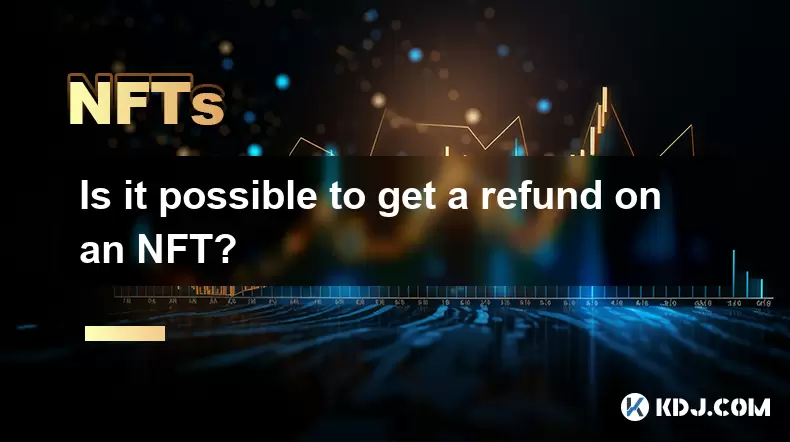
Is it possible to get a refund on an NFT?
Jul 21,2025 at 08:35pm
Understanding NFT Transactions and RefundsWhen you purchase an NFT (Non-Fungible Token), the transaction is typically recorded on a blockchain, making...
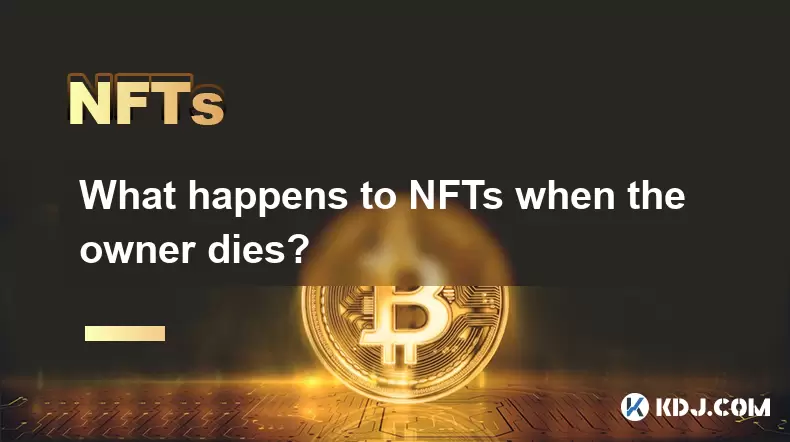
What happens to NFTs when the owner dies?
Jul 22,2025 at 02:43pm
Legal Ownership and Digital AssetsWhen an individual owns NFTs, the question of what happens to these assets upon their death is a pressing one. NFTs ...
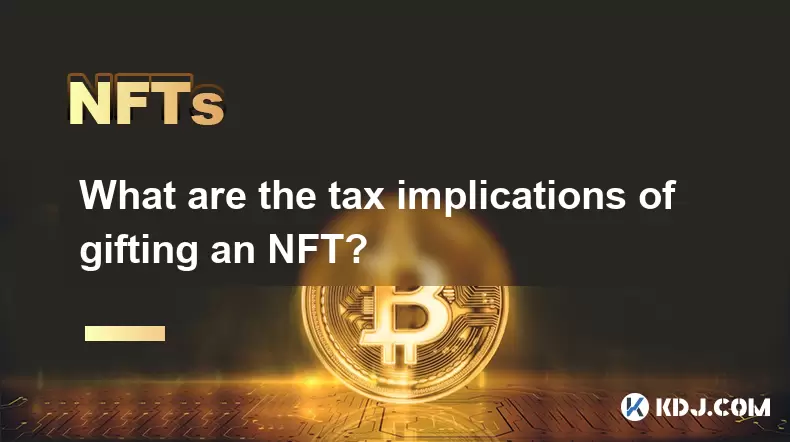
What are the tax implications of gifting an NFT?
Jul 19,2025 at 04:21am
Understanding the Basics of NFT GiftingGifting a Non-Fungible Token (NFT) involves transferring ownership from one individual to another without recei...
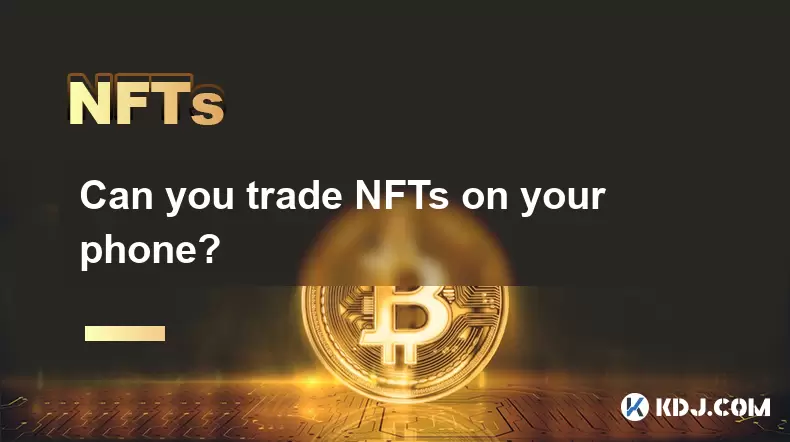
Can you trade NFTs on your phone?
Jul 18,2025 at 04:29am
Trading NFTs on Mobile DevicesYes, you can trade NFTs on your phone, and the process has become increasingly streamlined thanks to a variety of mobile...
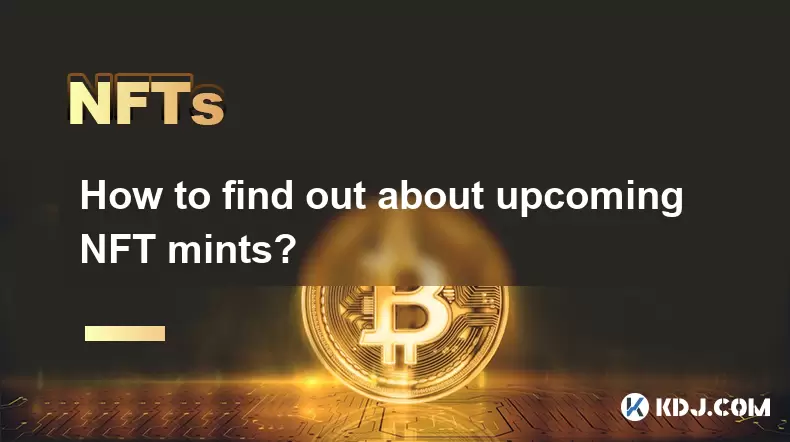
How to find out about upcoming NFT mints?
Jul 18,2025 at 11:50am
Exploring NFT Minting OpportunitiesUnderstanding the landscape of upcoming NFT mints is crucial for collectors, investors, and creators who wish to st...
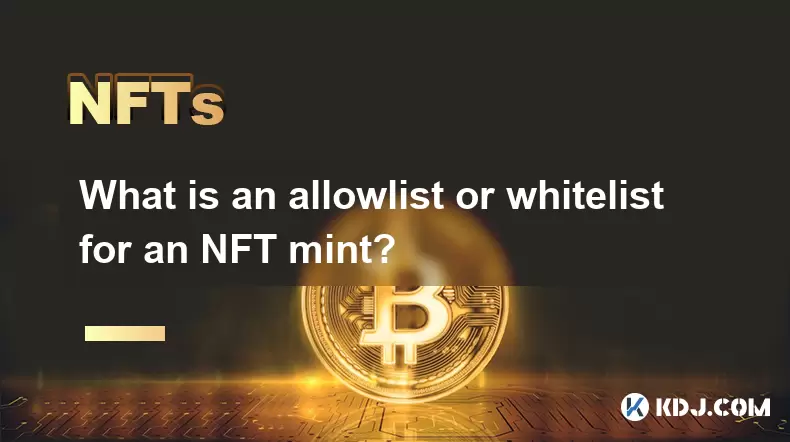
What is an allowlist or whitelist for an NFT mint?
Jul 20,2025 at 07:14pm
Understanding the Concept of an Allowlist for NFT MintingAn allowlist, also commonly referred to as a whitelist, is a mechanism used in the NFT mintin...

Is it possible to get a refund on an NFT?
Jul 21,2025 at 08:35pm
Understanding NFT Transactions and RefundsWhen you purchase an NFT (Non-Fungible Token), the transaction is typically recorded on a blockchain, making...

What happens to NFTs when the owner dies?
Jul 22,2025 at 02:43pm
Legal Ownership and Digital AssetsWhen an individual owns NFTs, the question of what happens to these assets upon their death is a pressing one. NFTs ...

What are the tax implications of gifting an NFT?
Jul 19,2025 at 04:21am
Understanding the Basics of NFT GiftingGifting a Non-Fungible Token (NFT) involves transferring ownership from one individual to another without recei...

Can you trade NFTs on your phone?
Jul 18,2025 at 04:29am
Trading NFTs on Mobile DevicesYes, you can trade NFTs on your phone, and the process has become increasingly streamlined thanks to a variety of mobile...

How to find out about upcoming NFT mints?
Jul 18,2025 at 11:50am
Exploring NFT Minting OpportunitiesUnderstanding the landscape of upcoming NFT mints is crucial for collectors, investors, and creators who wish to st...

What is an allowlist or whitelist for an NFT mint?
Jul 20,2025 at 07:14pm
Understanding the Concept of an Allowlist for NFT MintingAn allowlist, also commonly referred to as a whitelist, is a mechanism used in the NFT mintin...
See all articles























